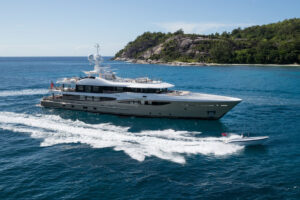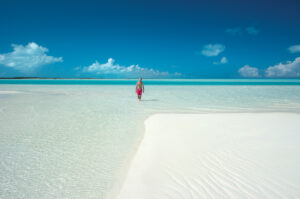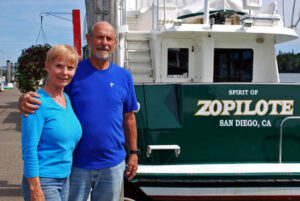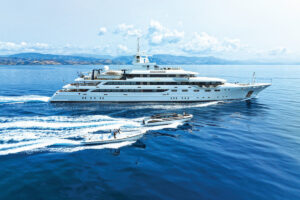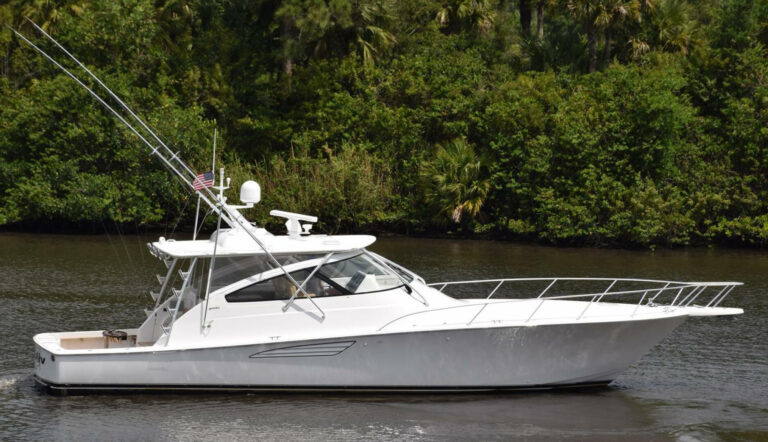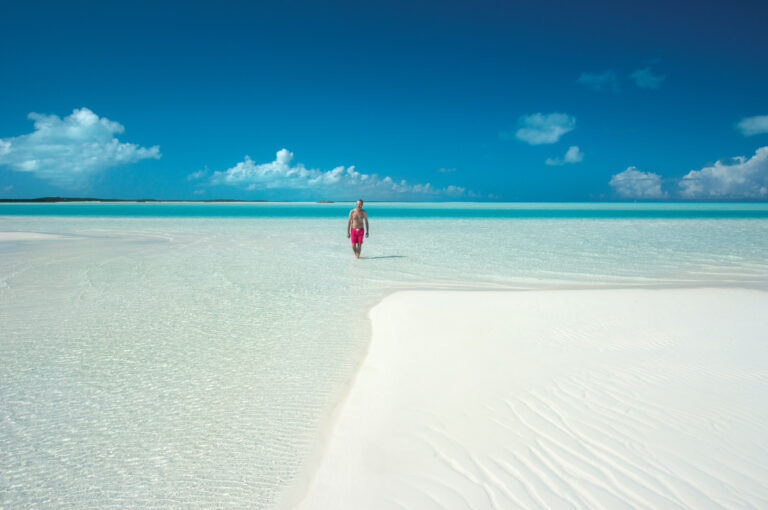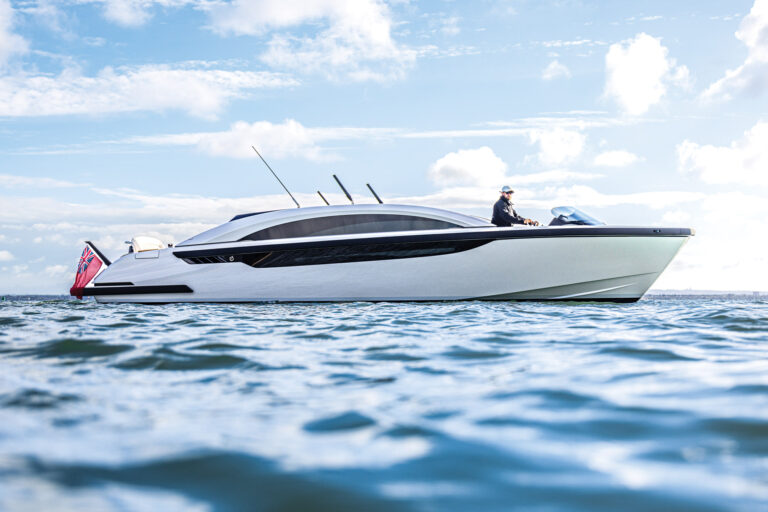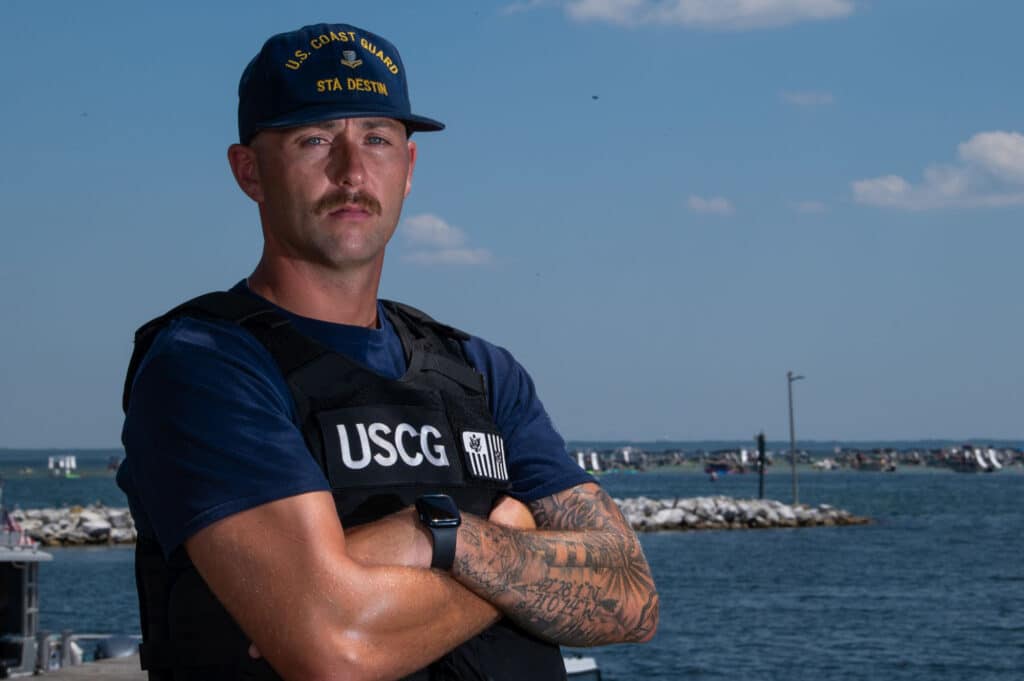
Four hundred miles off the coast of nowhere in the Pacific Ocean, U.S. Coast Guard Boatswain’s Mate 2nd Class Liam Coleman found himself in the middle of a counter-narcotics operation. He and his team had just seized a semisubmersible filled with bales of drugs and fuel, and he realized he was having an experience that few people ever encounter. Though he was initially drawn to the Coast Guard for its search-and-rescue mission, it’s moments like that one in the Pacific that have taught the Saugus, Massachusetts, native what this branch of the military can do. Coleman joins at least four generations of his family in serving other Americans: In total, 14 of Coleman’s family members are or were police officers, firefighters or nurses. “My entire family are civil servants. I grew up around that lifestyle and that idea that that’s just kind of what we do,” Coleman told Yachting. “The family business is helping people.”
Who or what was your inspiration for joining the Coast Guard?
Coleman: I am unsure if I ever had a single person or event inspire me to join the Coast Guard. Growing up just outside of Boston, I think I was always aware of the Coast Guard. I didn’t necessarily know what they did, but I can recall seeing the helicopters and boats out on Boston Harbor and being drawn to that as a kid.
What drew you to the Coast Guard over the other branches?
Coleman: My uncle served in Iraq as a corpsman with the Navy, and I always wanted to do something similar. I was sort of always aware of the Coast Guard and the general search-and-rescue mission that they performed in the Boston area. I think, since a very young age, I was drawn to that more than a traditional military branch.
What was it about your uncle’s service in the Navy that inspired you to want to do something similar?
Coleman: It’s always been kind of my calling. I went to college, and the only reason I went to college was because I went to a private Catholic high school. That was the trajectory. You go to high school, you go to college, then you work a desk job. That was the culture. I don’t typically like school that much, but I went to college because I thought that was what I was supposed to do. Didn’t love it, didn’t do great, and so I left school. I never had really any other thoughts besides that service lifestyle. It’s always been ingrained in me. It’s what we do; it’s what our whole family does.
What do you aspire to achieve in the Coast Guard? If known, what is your timeline to complete those goals?
Coleman: As far as achievements in my career, I am unsure of the overall goal, to be completely honest. I joined because I was completely lost in life at 21. I didn’t do well in college, I was working random dead-end jobs and just wasn’t on a path to success, at the time. I think taking the leap to sign up and get to boot camp was an achievement in itself. I think it’s something that, eight-and-a-half years later, I still look back on as a major milestone in my life. When it comes to my career, I’ve based a lot of my goals and plans off of a short-term plan. At the moment, I’m hoping to advance to Petty Officer First Class (BM1) and screen successfully for a command position in the future. In the long term, I think my goal is to positively impact as many people as I can, while I have the opportunity to wear the uniform.
Can you go into some more detail about what you were thinking and feeling on your first day of boot camp? What was that experience like for you to go from dead-end job after dead-end job and not doing well in college to something as formal and as strict as enlisting in one of the military branches?
Coleman: Once I got to the Philadelphia airport, it was kinda still, like, this unknown of excited and a little nervous, and we got on that bus, and we were probably 20 minutes out, and you see the sign for Training Center Cape May in New Jersey, where boot camp is held, and all the conversation on the bus just kinda ended, and this is about to get real. Someone hops on the bus, like in the movies, and the company commander is yelling at you. And it hit me like a freight train. It snapped me into that military lifestyle. I’m here; I’m in bootcamp, regardless of what branch you’re in.
It’s not so much that I didn’t have structure or couldn’t handle it, at first. You don’t know what to expect. About the transition, I don’t think it was that hard for me ‘cause I had thought about it for so long. It wasn’t as hard for me to have someone yell in your face. Just do what they say, do it well, and it’ll be over. I think people think, “This is my life now.” It’s only 2 months. Take it one step at a time. Make it to a meal, make it to bed, and then make it to the next day.
My big thing is my entire family are civil servants. My grandfather and father were Boston police officers; My mother and aunt—nurses. Going back four or five generations, everyone was a police officer, firefighters or nurses. I grew up around that lifestyle and that idea that that’s just kinda what we do. The family business is helping people—service of some kind. I’m gonna be in the Coast Guard, I’m gonna have tattoos, and I’m gonna be a firefighter.
Can you please recount your most interesting story with the Coast Guard?
Coleman: It would be hard to dial it down to the most interesting story I’ve had so far, but I think my favorite memory, so far, is in 2019 during a counter-narcotics operation in the Pacific Ocean. I was sitting inside of a semisubmersible filled with bales of suspected drugs and fuel, 400 miles off of who knows what country, with a buddy of mine who grew up 30 minutes away from me in Massachusetts. It was kind of this surreal moment where we both sort of just looked at each other and said, “Who’d have thought we’d be where we are right now?” For me, that will always be a really cool and memorable moment because it was something that none of our friends or relatives outside of the Coast Guard would ever understand or experience.
We went to [the] recruiter together, went to boot camp together. Me and him graduated in the same company. And you’re standing in formation, and they kinda just say like the graduation commences, and you can go see your family, and the first thing we did was turn to each other and gave each other a hug. I got orders to the ship that I was on. He went to officer candidate school, and he eventually became my team leader. It’s the middle of the night, pitch black, just me and him in the middle of the ocean, thinking like, “This is nuts, man. Think four years ago, five years ago, none of our boys would understand this.” Who’d have thought? This is exactly why I joined because little me driving an ambulance in Boston would never have imagined this.
If possible, apart from the day you enlisted, take me to a moment in your early days with the Coast Guard when you thought to yourself, “I’m changing my life for the better.” You mentioned you didn’t feel like you were on a path to success in life, prior to enlisting.
Coleman: My biggest moment was graduation from boot camp. As soon as I graduated, I saw my family and hugged my family again. That was, like, the first time I was like, “I’m here; This is what I’m doing.” I didn’t know what I wanted to do, but i knew what I didn’t want to do. And I knew that I needed a change of pace and to see the world. I had no say where I was gonna go out of boot camp, and that was sort of intriguing to me. I definitely came out a new person.
Please describe your history with the Coast Guard and your current responsibilities.
Coleman: I was born in Saugus, Massachusetts, six miles north of Boston. I joined the Coast Guard in 2015. My first duty station was an 87-foot patrol boat in Fort Lauderdale, Florida. I then attended Boatswain’s Mate A School in Virginia. After A School, I moved to Alameda, California, to serve on board USCGC STRATTON (WMSL-752). After California, I headed up to Seattle, Washington, to serve at the Maritime Safety and Security Team. After a short stint in Seattle, I received orders to Destin, where I have been a boatswain’s mate second class for three years. Currently, I wear many hats. I am a small-boat coxswain, boarding officer and deck department head. Currently, my main responsibilities include managing the maintenance, readiness condition, and overall upkeep and performance of the boats and all required safety and survival equipment. I also am a member of Station Destin’s training team, which is designed to ensure that training is being conducted in a manner that will meet the standard required for real-life operations.
If you weren’t in the Coast Guard, what would you be doing?
Coleman: If I wasn’t in the Coast Guard, I would probably be on a fire department in Massachusetts. Or playing for the Red Sox; I haven’t decided.

